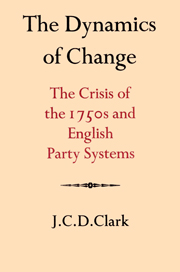Book contents
- Frontmatter
- Contents
- Preface
- Note on references
- Abbreviations
- Dedication
- Introduction
- 1 The Accession of Newcastle, March–September 1754
- 2 The Defeat of the Pitt–Fox Alliance, October 1754–March 1755
- 3 The Reconstruction of the Ministry, April–September 1755: Leicester House and the Recruitment of Fox
- 4 ‘That Exploded Trick’: Newcastle, Fox and the Defeat of Leicester House Patriotism, October 1755–March 1756
- 5 The Resignation of Newcastle, April–October 1756
- 6 The Pitt–Devonshire Ministry, October 1756–March 1757
- 7 ‘The Arbiter of England’: the Formation of the Newcastle–Pitt Coalition, April–June 1757
- Conclusion
- Notes
- Bibliography
- Index
5 - The Resignation of Newcastle, April–October 1756
Published online by Cambridge University Press: 06 July 2010
- Frontmatter
- Contents
- Preface
- Note on references
- Abbreviations
- Dedication
- Introduction
- 1 The Accession of Newcastle, March–September 1754
- 2 The Defeat of the Pitt–Fox Alliance, October 1754–March 1755
- 3 The Reconstruction of the Ministry, April–September 1755: Leicester House and the Recruitment of Fox
- 4 ‘That Exploded Trick’: Newcastle, Fox and the Defeat of Leicester House Patriotism, October 1755–March 1756
- 5 The Resignation of Newcastle, April–October 1756
- 6 The Pitt–Devonshire Ministry, October 1756–March 1757
- 7 ‘The Arbiter of England’: the Formation of the Newcastle–Pitt Coalition, April–June 1757
- Conclusion
- Notes
- Bibliography
- Index
Summary
Every man who pretends to be Minister in this country, is a fool, if he acts a day without the House of Commons; and a greater fool, if he depends upon any, of whom he cannot be sure…
Newcastle to Murray, 30 May 1756: 32865, f.143.… though nothing can be done without it, the word majority alone will not always settle the tranquillity of the nation.
Herring to Hardwicke, 23 October 1756: 35599, f-334-One of the chief causes of this unfortunate situation is, that we have now in truth no Minister; but the administration is a mere Republic, and carried on by the Cabinet Council, the individuals of which think only how to get the better of each other.
Chesterfield to Dayrolles, 17 June 1756: Dobrée, v, 2191.What will come out of all this, I am at a loss to know. The King and the public will suffer in parliamentary confusion, from causes, which I have never thoroughly understood… It is the wicked nonsense of faction for power, and lucrative employments, which will disable government from acting, according to the true sense and for the true ends of government… [will] destroy or intimidate the best administrations in this perverse or corrupt country.
Charles Yorke to Royston, 17 October 1756: 35360, f.254.Rear-Admiral Byng sailed on 6 April with a squadron of ten ships of the line for the defence of Minorca. A French invasion force landed there on 18 April and besieged the garrison in Fort St Philip.
- Type
- Chapter
- Information
- The Dynamics of ChangeThe Crisis of the 1750s and English Party Systems, pp. 231 - 282Publisher: Cambridge University PressPrint publication year: 1982



